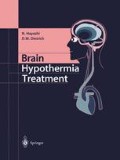Abstract
The importance of small variations in brain temperature on ischemic outcome was first investigated in models of transient forebrain global ischemia [2]. These controlled studies followed preliminary observations in experiments in which only core (rectal) temperature was monitored and maintained (36.5°C) indicating that 1) ischemic CA1 hippocampal pathology commonly varied from one study to the next, 2) that rectal (core) and intraischemic brain temperature differed significantly, and 3) that in anesthetized rats, intraischemic brain temperature was commonly hypothermic. Thus, selectively decreasing intraischemic brain temperature to 30°–34°C protected the CA1 hippocampus and dorsolateral striatum [2,4]. In gerbils, a 2°C drop in body temperature provided 100% protection in the CA1 hippocampus [6]. Brain cooling during prolonged (30min) global ischemia also protected the cerebral cortex from histopathological damage [12]. In models of cardiac arrest and cardiopulmonary bypass (CPB), hypothermic protection has also been reported [9,13–15,22].
Access this chapter
Tax calculation will be finalised at checkout
Purchases are for personal use only
References
Barone FC, Feuerstein GZ, White RF (1997) Brain cooling during transient focal ischemia provides complete neuroprotection. Neurosci Biobehav Rev 21:31–44
Busto R, Dietrich WD, Globus MY-T, Valdes I, Scheinberg P, Ginsberg MD (1987) Small differences in intraischemic brain temperature critically determine the extent of ischemic neuron al injury. J Cereb Blood Flow Metab 7:729–738
Chen H, Chopp M, Vande Linde AMQ, Dereski MO, Garcia JH, Welch KMA (1992) The effects of postischemic hypothermia on the neuronal injury and brain metabolism after forebrain ischemia in the rat. J Neurol Sci 107:191–198
Chen H, Chopp M, Jiang Q, Garcia JH (1992) Neuronal damage, glial response and cerebral metabolism after hypothermic forebrain ischemia in the rat. Acta Neuropathol 84:184–189
Chen H, Chopp M, Zhang ZG, Garcia JH (1992) The effect of hypothermia on transient middle cerebral artery occlusion in the rat. J Cereb Blood Flow Metab 12:621–628
Clifton GL, Jiang JY, Lyeth BG, Jenkins LW, Hamm RJ, Hayes RL (1991) Marked protection by moderate hypothermia after experimental traumatic brain injury. J Cereb Blood Flow Metab 11:114–121
Dietrich WD, Busto R, Alonso O, Pita-Loor Y, Globus MY-T, Ginsberg MD (1991) Intraischemic brain hypothermia promotes postischemic metabolic recovery and somatosensory circuit activation. J Cereb Blood Flow Metab 11(Suppl) 11:S854
Green EJ, Dietrich WD, van Dijk F, Busto R, Markgraf CG, McCabe PM, Ginsberg MD, Schneiderman N (1992) Protective effects of neural hypothermia on behavior following global cere bral ischemia. Brain Res 580:197–204
Horn M, Schlote W, Henrich HA (1991) Global cerebral ischemia and subsequent selective hypothermia. Acta Neuropathol 81:443–449
Karibe H, Chen J, Zarow GJ, Graham SH, Weinstein PR (1994) Delayed induction of mild hypothermia to reduce infarct volume after temporary middle cerebral artery occlusion in rats. J Neurosurg 80:112–119
Koizumi H, Povlishock JT (1998) Posttraumatic hypothermia in the treatment of axonal damage in an animal model of traumatic axonal injury. J Neurosurg 89:303–309
Kuluz JW, Gregory GA, Yu ACH, Chang Y (1992) Selective brain cooling during and after prolonged global ischemia reduces cortical damage in rats. Stroke 23:1792–1797
Laursen H, Waaben J, Gefke K, Husum B, Anderson LI, Sorensen HR (1989) Brain histology, blood-brain barr ier and brain water after normoth ermic and hypoth ermic cardiopulmonary bypass in pigs. Eur J Cardio-thorac Surg 3:539–543
Leonov Y, Sterz F, Safar P, Radovsky A (1990) Moderate hypothermia after cardia c arrest of 17 minutes in dogs. Stroke 21:1600–1606
Leonov Y, Sterz F, Safar P, Radovsky A, Ohu K-I, Tisherman S, Stezoski W (1990) Mild cerebral hypothermia during and after cardiac arrest improves neurologic outcome in dogs. J Cereb Blood Flow Metab 10:57–70
Lo EH, Steinberg GK (1992) Effects of hypothermia on evoked potentials, magnetic resonance imaging, and blood flow in focal ischemia in rabbits. Stroke 23:889–893
Morikawa E, Ginsberg MD, Dietrich WD, Duncan RC, Kraydieh S, Globus MY-T, Busto R (1992) The significance of brain temperature in focal cerebral ischemia: histopathological consequences of middle cerebral artery occlusion in the rat. J Cereb Blood Flow Metab 12:380–389
Nakamura T, Miyamoto O, Yanagami S-I, Hayashida Y, Itano T, Nagao S (1999) Influence of rewarming conditions after hypothermia in gerbils with transient forebrain ischemia. J Neurosurg 91:114–120
Okada Y, Tanimoto M, Yoneda K (1988) The protective effect of hypothermia on reversibility in the neuronal function of the hippocampal slice during long lasting anoxia. Neurosci Lett 84:277–282
Onesti ST, Baker CJ, Sun PP, Solomon RA (1991) Transient hypothermia reduces focal ischemic brain injury in the rat. Neurosurgery 29:369–373
Ridenour TR, Warner DS, Todd MM, McAllister AC (1992) Mild hypothermia reduces infarct size resulting from temporary but not permanent focal ischemia in rats. Stroke 23:733–738
Safar P, Klain M, Tisherman S (1996) Selective brain cooling after cardiac arrest. Crit Care Med 24:911–914
Xue D, Huang Z-G, Smith KE, Buchan AM (1992) Immediate or delayed mild hypothermia prevents focal cerebral infarction. Brain Res 587:66–72
Author information
Authors and Affiliations
Rights and permissions
Copyright information
© 2004 Springer Japan
About this chapter
Cite this chapter
Hayashi, N., Dietrich, D.W. (2004). Global and Focal Cerebral Ischemia. In: Brain Hypothermia Treatment. Springer, Tokyo. https://doi.org/10.1007/978-4-431-53953-7_2
Download citation
DOI: https://doi.org/10.1007/978-4-431-53953-7_2
Publisher Name: Springer, Tokyo
Print ISBN: 978-4-431-67964-6
Online ISBN: 978-4-431-53953-7
eBook Packages: Springer Book Archive

